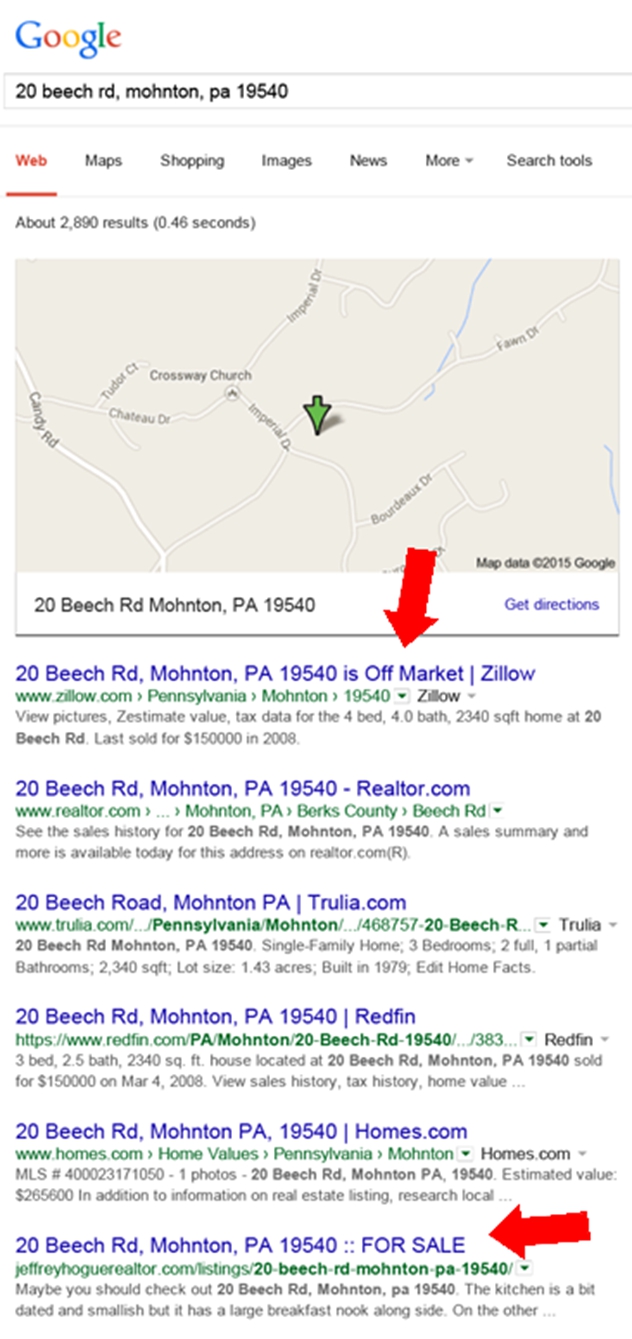You are viewing our site as an Agent, Switch Your View:
Agent | Broker Reset Filters to Default Back to ListHave Home Sellers Lost Their Status to Real Estate Portals?
April 28 2015
The large real estate portals giveth opportunity, but do they also taketh away the rights of home sellers and their agents?
 The hot topic in real estate used to be the marketing, buying and selling of homes and property. It seems as though the buzz has been replaced with debates and discussion on data feeds, real estate portals and syndication. It is reminiscent of the old days when there were issues of procuring cause and the like. I guess it's always a to-do when it is about money.
The hot topic in real estate used to be the marketing, buying and selling of homes and property. It seems as though the buzz has been replaced with debates and discussion on data feeds, real estate portals and syndication. It is reminiscent of the old days when there were issues of procuring cause and the like. I guess it's always a to-do when it is about money.
Procuring cause debates are normally between real estate agents and brokerages while data feed/syndication discussions can fall unknowingly on the property owners themselves.
When a homeowner signs a listing contract with a real estate brokerage, there is an understanding between the parties. This understanding is the foundation of the contract and includes things like fees for services (commission), contract length and marketing plan. The factors that make up the contract are often based on rules, regulations and guidelines relating to the laws and ethics of the real estate industry in the governing municipality where the property lies.
The listing contract often allows the home seller to opt-out of any online marketing. The seller may choose to opt-out of the online marketing world because they do not want their property to be subject to an Automated Value Model (AVM) such as the famous Zestimate®. The seller may want to only be in the local multi-list, but not on the national syndication sites. There may even be more personal reasons they do not want the mass syndication. It is also possible that Mr. and/or Mrs. Home Seller simply want their home information to be as correct as it can be and only trust their real estate agent and the agent's website to do so. After all, it is the brokerage and agent who they trusted and hired to sell the property, right? Whatever the reason for opting-out, choice is the issue here.
So what happens when the home seller and their agent make the choice to opt-out? While I cannot be sure what happens in every case, I can tell you what happened with a property that I opted-out of the MLS data feed. The address of that home is 20 Beech Rd, Mohnton, PA 19540. (Yes, I am exposing the address and you will soon understand why.)
 I Googled the address of the aforementioned home. The search showed 11 websites that listed the home in some fashion on the first five pages. The first listing was, you guessed it, the behemoth of online real estate portals, Zillow.com. This was not surprising, but how it was listed amazed me: 20 Beech Rd, Mohnton, PA is Off Market | Zillow.
I Googled the address of the aforementioned home. The search showed 11 websites that listed the home in some fashion on the first five pages. The first listing was, you guessed it, the behemoth of online real estate portals, Zillow.com. This was not surprising, but how it was listed amazed me: 20 Beech Rd, Mohnton, PA is Off Market | Zillow.
I immediately called Zillow customer support. I use the word immediately loosely; try and find that phone number--not easy. Once connected, I asked the attendant why Zillow would display a property that they have no data feed for as "Off Market"? The attendant, sounding a bit confused, stated, "If there is no direct feed, I could enter the property into Zillow directly using Postlets." From what I have read, Postlets is like Zillow's own little ListHub.
I proceeded to tell the attendant that the property was opted-out of online marketing portals on purpose. I believe at that very moment, the attendant may have had a minor stroke. For goodness' sake, who would opt-out of Zillow? He quickly placed me on hold to, as he stated, "speak to a manager" (or doctor). When he returned to the phone line, I was told that there are only two property statuses Zillow uses. One is "Active" and the other is "Off Market."
Once off the phone, I jumped back on my computer to see how the other real estate portals were displaying the home listing.
Second on the Google search was Realtor.com. My initial thought was, "Surely the big R.C. will have it listed correctly. After all, they are our namesake in the industry." Wrong again! While the home was not listed as "Active" or "Off Market" on the Google search, it only took one or two clicks to see the home was listed as "Not for Sale" on their site.
I called Realtor.com customer service (a much easier phone number to find) and told them of my toil. This time I emphasized the home status issue using a metaphor.
The metaphor went something like this: Suppose you were single and wanted desperately not to be. You decided to travel locally and meet new people. One day you get a call from an online dating service. They are the largest in the country and ask if you would like to sign up on their website for a fee. The attendant excitedly tells you, "There will be a better chance that you will no longer be single if you sign up." You cordially decline the solicitation. The caller then states that you can sign up for free if you just provide them with your information. Again, you courteously turn down the offering. Several weeks go by and you have not had any dates. You decide to Google your name and, lo and behold, the website that called you is first on the search with your name listed with the term "is not single" behind it. Take it a step further and say you did meet someone and that someone Googled your name. They now think you may be deceitful because they saw your name and the phrase "is not single."
The Realtor.com attendant got it! She stated that my call would get elevated to their legal department and I would be contacted within 24 hours. That was two more calls and five days (and counting) ago.
At number three on the Google search list was Trulia.com. The home was listed with public record information only. It did not say "Active" or "Off the Market." This, in my humble opinion, is all that should be displayed. I guess Zillow just does not care about what it says on Trulia anymore.
Redfin.com was at number four. While they displayed the home as "Sold," they adequately stated when that happened. This was more like a public record with no recent claims of property status. My assumption is that Redfin has decided to be more careful how they do things since they use a more conventional real estate office model than most online marketing companies.
Homes.com came in at number five on the Google search list. They are an "Active" or "Not for Sale" portal like Zillow, but without the "Not for Sale" listed with the address on the Google search page. One thing Homes.com does that seems a bit suggestive is list the paying agent as the "PREFERRED" agent over the listing agent or anyone else. Oh well, this article is not about how portals share data with other agents and confuse the heck out of would-be home buyers as to who represents who.
I did call Homes.com and the attendant was pleasant. She did state that the call would be elevated to a manager, but it is likely that the message was treated as the rest--like yesterday's newspaper (not the one in the trash, but the one on the bottom of a canary cage). On a brighter note, their customer number was easy to find.
At number six on the list was my own personal website, JefreyHogueRealtor.com. Yes, it does list the home as active! This was agreed to by the sellers. Remember, that listing contract thing. I hand enter the homes I list onto my website. I have found this to be the best way to have them rank higher in a Google search. Since the home has been opted-out, it is not even on my own, or any other, IDX data feed. I will discuss IDX feeds later in this article.
Weichert.com, my franchise office, shows up at number seven. They list the home on their property page as "No Longer Active." Guess I owe them a call.
Number eight is Movoto.com. They list the property as "Sold" and display it more like the public record.
At nine, 10 and 11 were HomeFinder.com, ZipRealty.com and Revestor.com, respectively. They all listed the property as "Off Market" on the property page.
So what did I learn from this exercise?
In the fall of 2000, the National Association of Realtors (NAR) posted a legal update. It stated the following: "To encourage uniform Internet listing opportunities for all REALTORS®, NAR's Board of Directors made reciprocal Internet Data Display a mandatory policy effective Jan. 1, 2002." This was the advent of broker reciprocity and the Internet Data Exchange (IDX).
It was stated that much of this was done because real estate brokers and their Realtors® wanted to have a fair shot at providing property listing information to prospective customers from their own websites. This was already being done on Realtor.com and many other websites of the day.
One of the early adopters stated the following in 2000: "We wanted to level the playing field,' says Shawn Dauphine, MLS director of the Houston Association of REALTORS®, which already has a reciprocal listing policy in place. Some local brokers were already posting the MLS on their sites, since the rules on this practice were 'foggy,' says Dauphine. So Houston decided that 'either we go after the broker data pirates or we make it so that everyone can do it, but put in some regulations,' he says."
And heap on some regulations NAR did. They strengthened the multi-list's position as it related to the sharing of property data. Many of the regulations were desired by brokers and Realtors® alike. But alas, in my opinion, they went too far. They greatly limited what and how brokerages and Realtors® could market to the public through the IDX feed by over-regulating it and not allowing it to be more customer friendly.
The multi-list companies were, and in many cases still are, trying to keep with the founding rules (you know, the reason they were created in the first place): They were set up to be a suite of services that enables real estate brokers to establish contractual offers of compensation (among brokers), facilitates cooperation with other broker participants, accumulates and disseminates information to enable appraisals, and is a facility for the orderly correlation and dissemination of listing information to better serve broker's clients, customers and the public. Furthermore, the listing data stored in a multiple listing service's database is the proprietary information of the broker who has obtained a listing agreement with a property's seller. This was simply a Business to Business (B2B) service that has grown into an anachronism.
Data and information on almost anything, especially real estate, have turned into a Business to Customer (B2C) relationship because there is plenty of money in it. When that happens, things change. For example, the IDX that was set up years ago is still inundated with rules. Most IDX vendors will tell you how hard it is to work with many Multi-Listing Companies and their Associations.
While IDX vendors are still taking it on the chin, many of the same Multi-Listing Companies are negotiating data feed deals with major real estate portals. These deals likely allow for companies like Zillow.com to only display two property statuses, "Active" and "Off the Market." If an IDX vendor does not change the status of a property within a limited period of time, they can be fined or expelled from the MLS. Could you imagine putting an AVM in an IDX feed?
Much of this dealing sounds like our, yes Realtors®, our Multi-Listing Companies selling out OUR data and leaving us with the over regulated IDX and the vendors we work with. This is not what I think NAR meant by leveling the playing field in 2000.
I would not be surprised to see IDX and similar companies out there seeking effective counsel on the matter someday. Seems like they are getting the raw end of the MLS data stick to me.
Earlier I used the dating metaphor, but a like-kind scenario could exist with every business that can be marketed on the web. What this means to me is that the biggest gorilla in the store can push everyone around.
Suppose you open a restaurant and have your own website. You are contacted by Yelp.com. They want money for a great placement of your restaurant on their site. If you don't want to pay, they still want the information. For whatever reason, you do not desire their assistance. Later you find out that they are all over the first page of most Google searches for restaurants and they all say you are "Not Open for Business." Seems like bullying, false advertising, or advertising extortion to me.
I believe that for the most part the real estate portals do a fair job. They obviously did a better job than NAR, Realtor.com, large real estate companies and most Multi-Listing Companies. This is evident in the public's acceptance of the real estate portals' offerings to date.
 It seems as though most portals, especially the giants, are in complete takeover mode. Maybe after they do take over the industry, they will adopt acceptable rules and regulations that allow people, like home sellers, choice without encumbrance (search Google Search Story). Or maybe then the feds will step in and claim there are anti-trust issues and that guidelines have to be implemented.
It seems as though most portals, especially the giants, are in complete takeover mode. Maybe after they do take over the industry, they will adopt acceptable rules and regulations that allow people, like home sellers, choice without encumbrance (search Google Search Story). Or maybe then the feds will step in and claim there are anti-trust issues and that guidelines have to be implemented.
It was once or twice said that with great power comes great responsibility. I ask that all real estate portals and MLS Companies please consider the following: When you are taking our real estate information and selling it to the highest bidder so we lose customers and opportunity, we will not stand still. When we cannot be at the top of any search for homes we list on any search engine, we will not be happy. When you misrepresent the properties that are for sale and state that they are "Off the Market" to force us to comply, we will not. When you take away the seller's status or rights as a property owner, we will fight back for our sellers. Oh, and one more thing--at least act like you care about us and listen to what we have to say. After all, we are supposed to be your customers.
Please note, we are the Realtors® of these United States of America.
Who knows maybe a new WAV is coming and there will be a new buzz in the real estate market.









